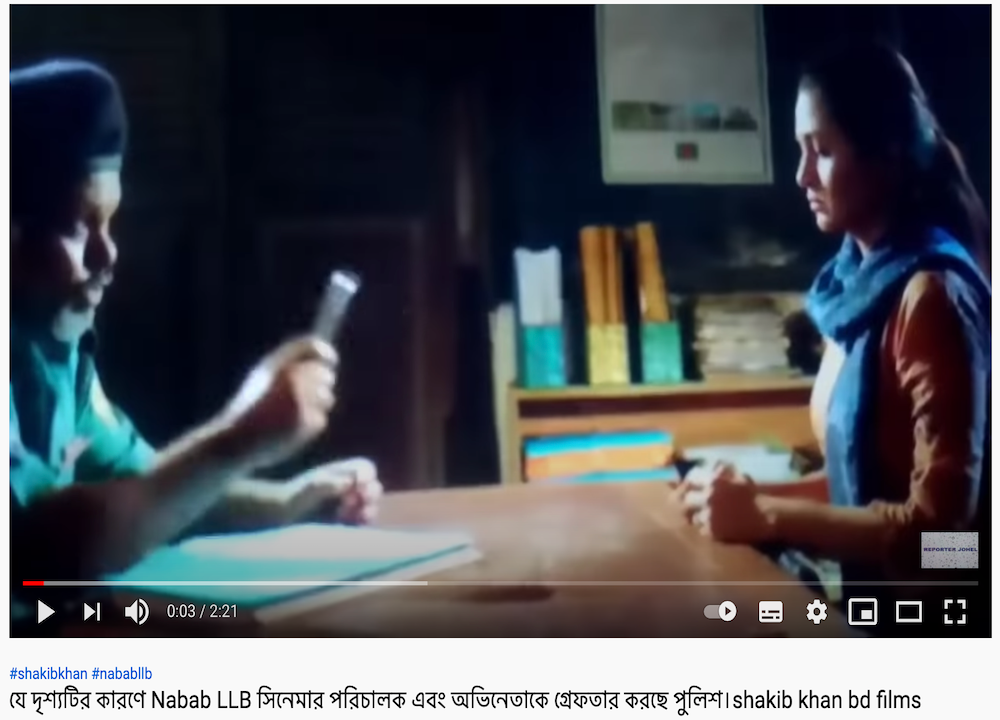
In Bangladesh, it can take courage for a newspaper to write about the realities of the country’s law enforcement activities – their role in torture, extra-judicial killings, disappearances, and corruption.
Now, however, even relatively milder fictional representations of their unprofessional conduct can land you in jail.
This week Anonno Mamun, director of the feature film Nabab LLB and Shaheen Mridha, the actor who plays a police officer was arrested and sent to jail. Their crime? A scene in the film in which the police officer questions a woman who has come to report her own rape. The scene, in which the officer sits behind a desk goes like this:
Police: Answer correctly. If you give any wrong answers, I will make sure you eat in jail. Do you understand? Now say your name
Woman: Iffat Arfin Shupra
Police: Father’s name?
Woman: Late Omar Siddique
Police: Mother’s name?
Woman: Ayesha Omar Siddique
Police: When did the incident happen?
Woman: 2 March
Police: Time?
Woman: Midnight or ten past midnight
Police: How many were there?
Woman: 3 people
Police: 3 people? Did you know them from before?
Woman: One of them. My boss. Newaz Bashar
Police: Are you married?
Woman: No.
Police: When was your last period?
Woman: 15 or 16 days ago
Police: Before that incident did you have any sexual experience, I mean were you a virgin? Or
Woman: No.
Police: Did you do any medical tests after the incident?
Woman: My family did not allow me to do the tests
Police: Where are the cloths you had that day?
Woman: My mother has burnt them all
Police: Did they use any force?
Woman: They forced me from rickshaw to the car
Police: Was there penetration by the penis? You understand? Hey, why are you quiet? I have to note this down for the case. Why are you silent? Had it gone inside or not gone inside?
Woman: Yes
Police: Who went first
Woman: Newaz Bashar. And then his two friends, one after the other
Officer: Position? Were they all above you or were you on top?
Woman: They were on top of me
Officer: Did they ejaculate? …
Woman: Does any man stop before that?
Officer: Was it inside or outside?
Woman: They were wearing condoms
Officer: Oh you were in a state of mind to notice the condom! We are done here, the rest [of the procedure] are tests at a government hospital
You can see the film clip below.
Whilst one can be pretty sure that many women in Bangladesh, in a similar position to this fictional character, have suffered far more inappropriate law enforcement interviews, Bangladesh’s police took a highly righteous position. Dhaka Metropolitan Police (DMP) issued a statement claiming that:
“The officer was interrogating her using very offensive gestures and obscene language which is the opposite of healthy entertainment and will create negative perceptions about policing among the public.”
From righteousness, the police reaction turned to hysteria. “There are biased, intentional, untrue and baseless information and lurid presentations in some parts of the movie which go contrary to the established laws of the country,” Md Sohel Rana, the Assistant Inspector General (AIG), Media and PR of Bangladesh Police. told VICE World News
The Bangladesh police however did not just leave it at this hyperbolic rhetoric. The DMP statement said the director and actor was arrested “for making and acting in a film containing such offensive and obscene dialogue”.
How, you may ask, could involvement in this fictional representation of a police interview ever be deemed a criminal offence? In an extraordinary move, the police decided to term it “pornography” and detain them under the Pornography Control Act 2012.
It does not take more than a cursory look at this law to realise that these arrests have no legal basis.
In the legislation, pornography is defined in section 2
“Any obscene dialogues, performances, gestures, nude or half-naked dances that cause sexual arousal that are captured and displayed in movies, video images, audio-visual images, still images, graphics or any other means and which have no artistic or educational value. ”
Even if you were to accept – and this in itself is a real stretch – that some of the dialogue was “obscene”, it is beyond belief to argue that this could cause “sexual arousal”. So how is it pornography?
Moreover, the definition makes clear that obscene dialogue is only pornographic if it has no “artistic or educational value” – which clearly this film has.
If there was an independent judiciary in Bangladesh, the court would have stopped the men being sent to jail. But magistrates in the country undertake no scrutiny of cases before them and when a person is arrested and brought to court they almost always automatically remand the accused back into state custody – even when the most superficial inquiry would show there is no legitimate case to do so . And that is exactly what happened here.
The film has nothing to do with pornography, and the police are well aware of it. The 2012 Act is just being used as a flimsy shield to try and hide their desperate attempt to punish those who dare depict police in anything other than in glowing terms. It is straightforward censorship.
The arrests will not go unnoticed in Bangladesh’s artistic community. The incident sends a clear message: certain criticisms of those in power will not be tolerated, not even in fiction.
//David Bergman
See Netra News main website
For those in Bangladesh
For those outside Bangladesh.
And its Youtube Channel
